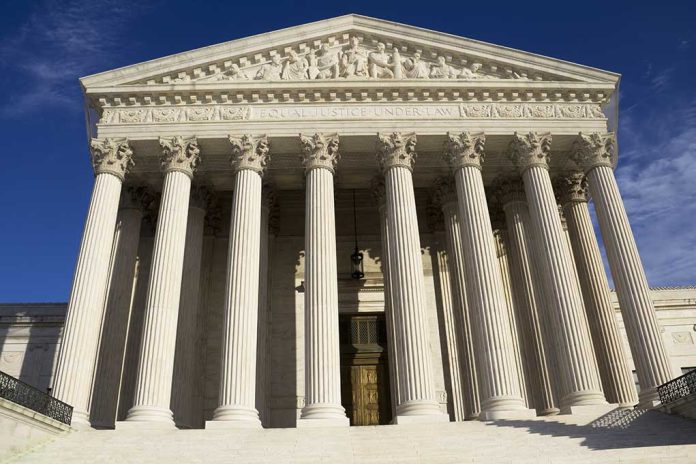
The Supreme Court has handed Donald Trump multiple legal victories, allowing his administration to continue deportations of Venezuelan migrants and pausing orders that would have released foreign aid funds and reinstated thousands of federal employees.
Key Takeaways
- The Supreme Court allowed deportations of Venezuelan migrants to continue, ruling that the lawsuit was filed in the wrong court and should have been filed in Texas.
- Chief Justice John Roberts issued an administrative stay pausing a lower-court order that would have required the Trump administration to release over $1.5 billion in foreign aid.
- The Court halted a lower court order requiring the Trump administration to reinstate thousands of dismissed federal employees, letting them remain on paid administrative leave instead.
- All nine justices agreed that migrants must receive advance notice and opportunity to challenge deportation, potentially adding restrictions to how the administration uses the Alien Enemies Act.
- These decisions demonstrate legal momentum for the Trump administration’s efforts to reshape federal agencies and immigration policy.
Supreme Court Allows Deportations to Continue
In a significant ruling, the Supreme Court has allowed the Trump administration to continue deporting Venezuelan migrants using wartime powers under the Alien Enemies Act. The Court’s 5-4 decision overturned a lower court’s temporary halt on these deportations. This narrow procedural ruling stated that the lawsuit challenging the deportations was filed in the wrong jurisdiction. “The detainees are confined in Texas, so venue is improper in the District of Columbia,” the Supreme Court declared in its decision, redirecting the legal challenge to Texas courts where the migrants are being detained.
While allowing deportations to proceed, the Court emphasized that migrants must receive notice “within a reasonable time” to allow them the opportunity to challenge their removal. This requirement could impose new restrictions on the Trump administration’s use of the Alien Enemies Act going forward. The ruling marks a legal victory for the administration’s immigration enforcement efforts, though it did include procedural guardrails that all nine justices agreed upon regarding notification requirements.
🚨🚨 BREAKING: #SCOTUS delivers major victory for @realDonaldTrump's Administration: Can immediately begin deporting gang members again; Judge Boasberg set straight and off the case. Barrett sold out…again. #MAGA #MassDeportation #LiveLifeBoldly pic.twitter.com/n22QennSpy
— Regular Joe (@RegJoeShow) April 8, 2025
Foreign Aid Funding Freeze Upheld
In another victory for the Trump administration, Chief Justice John Roberts issued an administrative stay that pauses a lower-court order requiring the release of over $1.5 billion in foreign aid to various organizations. The funding freeze has significantly impacted groups like the AIDS Vaccine Advocacy Coalition and the Journalism Development Network, disrupting global humanitarian assistance. This administrative stay gives the Supreme Court time to review the case in full before making a final determination on whether the funding should be released.
The Trump administration had halted foreign assistance for 90 days as part of a broader plan to cut over 90% of USAID’s foreign aid contracts and approximately $60 billion in U.S. foreign assistance overall. Washington D.C. District Court Judge Amir Ali had previously ordered these funds to be released, but Roberts’ stay effectively blocks that order for now. The Court could eventually extend the pause indefinitely or require the administration to release the funds, depending on their final ruling.
Federal Employee Dismissals Remain in Effect
The Supreme Court has also halted a lower court order that would have required the Trump administration to reinstate thousands of dismissed federal employees. This decision came in response to an emergency appeal of a California judge’s ruling to reinstate approximately 16,000 probationary employees from six federal agencies. As a result of the Supreme Court’s decision, these affected employees will remain on paid administrative leave rather than being reinstated to their positions.
A separate but related lawsuit in Maryland had resulted in a similar ruling blocking the firings, which applied to 19 states and the District of Columbia. The Justice Department is currently appealing this Maryland decision as well. These legal victories provide the Trump administration with momentum in its efforts to reshape federal agencies according to its priorities. Together with the immigration enforcement and foreign aid rulings, they represent significant legal support for key administration policies.
Implications for Trump’s Policy Agenda
The series of favorable Supreme Court rulings strengthens the Trump administration’s position on multiple policy fronts. On immigration, the administration can continue using the Alien Enemies Act to deport Venezuelan migrants alleged to be gang members, though with new procedural requirements. On government staffing, the administration retains authority over personnel decisions affecting thousands of federal employees. And on foreign policy, the administration maintains control over billions in foreign aid funding pending further review.
These legal victories provide the Trump administration with significant leverage in implementing its policy agenda across multiple domains. While some aspects of the rulings impose procedural requirements that the administration must follow, the core policy initiatives have received judicial backing. As these cases continue through the legal system, the administration appears to be gaining momentum in defending its executive actions against legal challenges.
Sources:
Supreme Court Clears Way for Venezuelan Deportations to Resume, for Now
SCOTUS Hands Trump His First Legal Victory of Second Term
Supreme Court Hands Donald Trump Another Win



